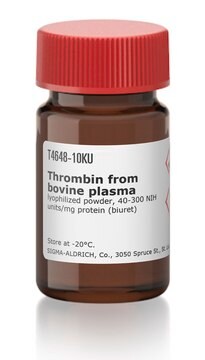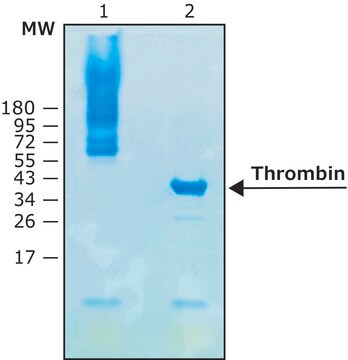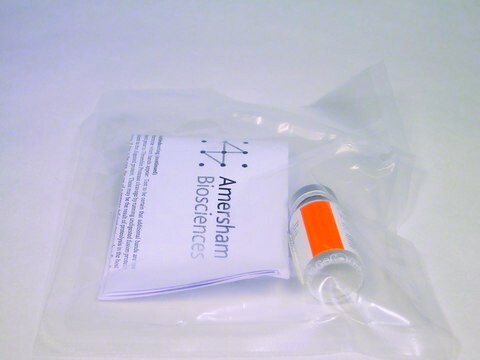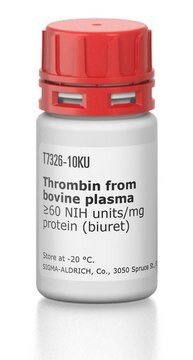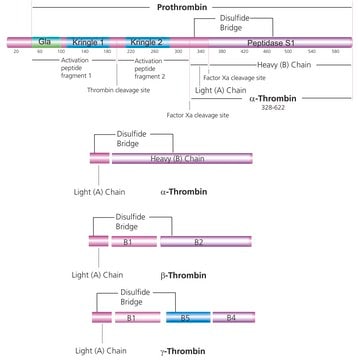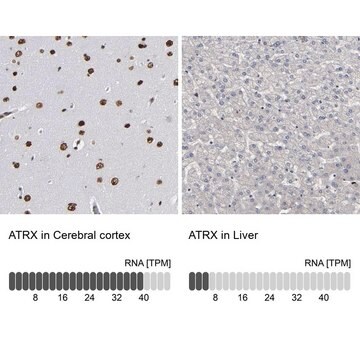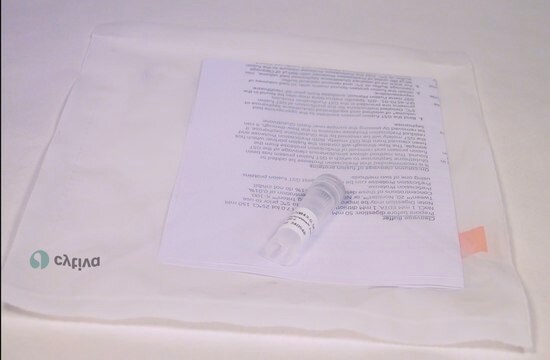RECOMT
Thrombin CleanCleave™ Kit
Synonym(s):
Thrombin Cleavage Kit
Sign Into View Organizational & Contract Pricing
All Photos(1)
About This Item
UNSPSC Code:
12352200
NACRES:
NA.56
Recommended Products
form
suspension
Quality Level
mol wt
37 kDa
technique(s)
protein purification: suitable
shipped in
wet ice
storage temp.
2-8°C
General description
The Thrombin CleanCleave Kit contains a 50% suspension fo thrombin-agarose produced by immobilizing bovine thrombin and is designed for cleavage of recombinant fusion proteins
Application
For cleaving a tag from a recombinant fusion protein which contains the thrombin recognition sequence. Thrombin-agarose is compatible with recombinant proteins expressed in various types of expression systems.
Features and Benefits
- Fast, efficient cleavage in as little as 2 hours
- Thrombin is covalently bound to agarose for easy removal.
- The robust cleavage reaction is effective at temperatures from 4 °C to 37 °C and over a wide range of pH and ionic strengths.
- Cleave tags even in the presence of 0.1% Triton™, 1 M urea or 5 mM EDTA
- Thrombin-agarose is reusable.
Quantity
200 μl of a 50% slurry of thrombin-agarose cleaves >85% of 1 mg of fusion protein.
Legal Information
CleanCleave is a trademark of Sigma-Aldrich Co. LLC
Triton is a trademark of The Dow Chemical Company or an affiliated company of Dow
Kit Components Only
Product No.
Description
- Thrombin Cleavage Buffer, 10× 10 mL
Related product
Product No.
Description
Pricing
Storage Class
10 - Combustible liquids
flash_point_f
Not applicable
flash_point_c
Not applicable
Certificates of Analysis (COA)
Search for Certificates of Analysis (COA) by entering the products Lot/Batch Number. Lot and Batch Numbers can be found on a product’s label following the words ‘Lot’ or ‘Batch’.
Already Own This Product?
Find documentation for the products that you have recently purchased in the Document Library.
Customers Also Viewed
Anna-Maj Albertsson et al.
Journal of neuroinflammation, 11, 197-197 (2014-12-04)
Osteopontin (OPN) is a highly phosphorylated sialoprotein and a soluble cytokine that is widely expressed in a variety of tissues, including the brain. OPN and OPN-derived peptides have been suggested to have potential neuroprotective effects against ischemic brain injury, but
Jolanta Krucinska et al.
Biochemistry, 58(9), 1188-1197 (2019-02-05)
Enolase is a glycolytic metalloenzyme involved in carbon metabolism. The advantage of targeting enolase lies in its essentiality in many biological processes such as cell wall formation and RNA turnover and as a plasminogen receptor. We initially used a DARTS
Takeshi Uchida et al.
The Journal of biological chemistry, 279(50), 51981-51988 (2004-10-07)
The heme chaperone CcmE is a novel protein that binds heme covalently via a histidine residue as part of its essential function in the process of cytochrome c biogenesis in many bacteria as well as plant mitochondria. In the continued
Ohad Fisher et al.
Nucleic acids research, 32(1), 287-297 (2004-01-13)
The DNA methylation status of the protozoan parasite Entamoeba histolytica was heretofore unknown. In the present study, we developed a new technique, based on the affinity of methylated DNA to 5-methylcytosine antibodies, to identify methylated DNA in this parasite. Ribosomal
Andrea Angeli et al.
Journal of enzyme inhibition and medicinal chemistry, 36(1), 758-763 (2021-03-16)
We report the first activation study of the β-class carbonic anhydrase (CA, EC 4.2.1.1) encoded in the genome of the protozoan pathogen Trichomonas vaginalis, TvaCA1. Among 24 amino acid and amine activators investigated, derivatives incorporating a second carboxylic moiety, such
Our team of scientists has experience in all areas of research including Life Science, Material Science, Chemical Synthesis, Chromatography, Analytical and many others.
Contact Technical Service